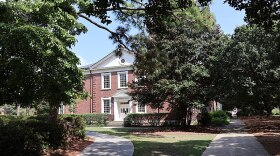Over the summer, The Oversight Project, a spin-off of the conservative think tank The Heritage Foundation, filed a public records request for course materials from several UNC-Chapel Hill classes. It asked for syllabi, lecture slides, and presentation materials that contained terms like diversity, equity, and inclusion; LGBTQ+; and systems of oppression.
The request targeted 74 courses total, ranging from classes on "Diversity and Inequalities in Cities" or "Muslim American Literatures and Cultures" to seminars on "Mobility, Road, NASCAR, and Southern Culture" or "Love in Classical Persian Poetry."
The Oversight Project claims the request was to assess UNC's compliance with executive orders from the Trump administration to axe DEI programming and initiatives.
"Our goal ultimately is to get this garbage out of colleges and universities," said Mike Howell, the organization's president and the filer of the request. "And get back to a better society where this ideology isn't affecting every last aspect of it."
UNC-Chapel Hill took several weeks to respond to the Oversight Project, sending a reply in late August denying to fulfill the public records request on the grounds of faculty's intellectual property rights.
But other universities across the country – and some in the UNC System – may interpret the request – and the issue of faculty intellectual property rights – differently.
Who owns a course syllabus?
There's no federal legal precedent for who owns course information like a syllabus and faculty's intellectual property rights differ from state to state.
Some, like Arizona, have intellectual property policies that state the university system board owns course materials. Others, like Texas, have passed legislation that require faculty members to publicly post their syllabi online.
North Carolina doesn't have a similar all-encompassing policy for its public university campuses. While the UNC System's patent and copyright policy includes coursework produced by faculty members as a "copyrightable work," its policy doesn’t say anything about whether course materials are public records.

"A lot of faculty thought that these were not subject to open records requests, but what we're hearing now from attorneys is that they may be subject to those requests," said Wade Maki, the Faculty Assembly Chair for all 16 of the UNC System's public universities and a philosophy professor at UNC Greensboro.
Right-leaning organizations aren’t just hitting UNC-Chapel Hill with these types of public records requests. Recently, groups have also announced plans to or requested course materials from North Carolina A&T State, UNC Greensboro, UNC Pembroke, and several other state universities.
"These requests also tried to get at course content – so my actual lecture notes, for example, the slides that I create," Maki said. "Those are not only my intellectual property, but they're not something that is traditionally turned over to the university or kept in a database. So, to ask for that sort of content signifies a significant escalation in requiring faculty to turn over what is really their intellectual property. It's not owned by the university."
How do intellectual property rights intersect with public records law?
Intellectual property protects creative works that originate in the mind and has three components: patents, trademarks, and copyright, said Wake Forest University law professor Zaneta Robinson.
"As long as it's original and the professor creates it, then it's probably going to be protected by copyright," Robinson said. "Depending on the extent to which there is an intellectual property policy in place at the institution or the professor has a written contract that speaks to (those) rights. Or in the absence of either one, the default is going to apply – it's absolutely going to be covered by copyright."
Robinson is the founding director of Wake Forest University's intellectual property law clinic and used to direct a similar program at UNC-Chapel Hill. She said copyright can sometimes be a "gray area" in higher education.
"As the copyright owner, you get to control where things go and how it's treated, but public records law is a little bit different. FOIA is a little bit different. It depends on the nature of the request," Robinson said. "There's so many other things that you have to weigh that copyright doesn't necessarily trump but you need to be aware of."
As state employees, faculty at public universities are held to North Carolina's public records law. The mandate requires information dealing with university business be an open record. This ranges from salaries and promotions to professor's email communications.

But there are many exceptions that protect confidential information like ongoing research or students' personal records. UNC-Chapel Hill administrators have made it clear they believe that exemption also extends to syllabi, lecture notes, and other course materials.
"Faculty members have the opportunity to provide their course materials to whoever is doing the request, but are explicitly not required to do so," said Interim Provost Jim Dean at a faculty council meeting last week. "Per university and UNC System policy, the faculty member is the holder of the copyright for their course materials. I think that's a really important point to stress."
Howell, the Oversight Project president, said he believes it's an "audacious move" for UNC-Chapel Hill to claim course materials like syllabi are protected by intellectual property rights.
"(Syllabi) are often shared not only with the student body writ large, thousands and thousands of people, but accrediting bodies and elsewhere," Howell said. "To act like it is the secret recipe for Coca Cola or KFC's seasoning recipe is laughable legally."
Howell said his group is considering suing UNC-Chapel Hill for the materials.
"If a publicly-funded institution can claim intellectual property to hide something as basic as this, the precedent for moving forward for other things is absolutely outrageous," Howell said. "...how your taxpayer dollars are spent, even at a public university, are done in your name and with your dollars. We believe people should know how that money is being spent and if it's being spent on racist DEI curricula and that's reflected in their syllabi, they deserve to know."
Robinson said intellectual property rights are protected in the U.S. Constitution.
"Generally, course materials are going to more than likely be covered by copyright law," Robinson said. "There is actually an intellectual property clause in the Constitution. So, most laws pertaining to copyright and patent law are a matter of federal law."
Academic freedom in the Trump 2.0 era
Howell was able to obtain at least one UNC-Chapel Hill syllabus outside of his public records request. It was from an introductory business class on organizational behavior.
The Oversight Project posted part of the syllabus on X, criticizing it for having a section on diversity and cross-cultural issues and requiring readings like 'Dear White Boss.'
Chris Petsko is the professor of the course and said the lesson covers stereotyping and prejudice in the workplace, an unavoidable topic when discussing social dynamics and the psychology of businesses.
Shortly after the Oversight Project's post, people spammed Petsko's X account with homophobic comments. The hate became so overwhelming that Petsko decided to leave the platform.
"I have deliberately made some efforts to mute myself in certain ways, because the fear is real," Petsko said. "I don't want to have to deal with this backlash and it's a distraction. And it's scary to my colleagues."

Maki, the faculty assembly chair, said "fishing expeditions" by right-wing groups are creating an intimidating environment for faculty members throughout the UNC System.
"Everyone else recognizes that what happens at Chapel Hill today is likely to spread to the rest of us tomorrow," Maki said. "Ultimately, this is about our ability to educate students and for them to have that free exchange of ideas. If faculty are self-policing because of an activist group with a politically ideological driven agenda on a fishing expedition, that's bad for education. That's bad for students."
Public university faculty members' academic freedom has been shaky in recent years. State and UNC System leaders have attempted to or undermined typically faculty-led processes from setting curriculum to mandating general education requirements.
Maki said faculty are deeply concerned the everyday classroom is the next target. He's leading a cross-university effort to define academic freedom at the UNC System level to "protect it from further interference."
WUNC partners with Open Campus and NC Local on higher education coverage.









